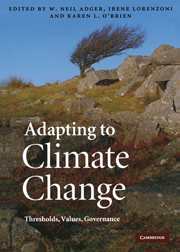Book contents
- Frontmatter
- Contents
- List of contributors
- Preface
- 1 Adaptation now
- Part I Adapting to thresholds in physical and ecological systems
- Part II The role of values and culture in adaptation
- Part III Governance, knowledge and technologies for adaptation
- 20 Whether our levers are long enough and the fulcrum strong? Exploring the soft underbelly of adaptation decisions and actions
- 21 Decentralized planning and climate adaptation: toward transparent governance
- 22 Climate adaptation, local institutions and rural livelihoods
- 23 Adaptive governance for a changing coastline: science, policy and publics in search of a sustainable future
- 24 Climate change, international cooperation and adaptation in transboundary water management
- 25 Decentralization: a window of opportunity for successful adaptation to climate change?
- 26 Adapting to climate change in Sámi reindeer herding: the nation-state as problem and solution
- 27 Limits to adaptation: analysing institutional constraints
- 28 Accessing diversification, networks and traditional resource management as adaptations to climate extremes
- 29 Governance limits to effective global financial support for adaptation
- 30 Organizational learning and governance in adaptation in urban development
- 31 Conclusions: Transforming the world
- Index
- References
28 - Accessing diversification, networks and traditional resource management as adaptations to climate extremes
Published online by Cambridge University Press: 31 August 2009
- Frontmatter
- Contents
- List of contributors
- Preface
- 1 Adaptation now
- Part I Adapting to thresholds in physical and ecological systems
- Part II The role of values and culture in adaptation
- Part III Governance, knowledge and technologies for adaptation
- 20 Whether our levers are long enough and the fulcrum strong? Exploring the soft underbelly of adaptation decisions and actions
- 21 Decentralized planning and climate adaptation: toward transparent governance
- 22 Climate adaptation, local institutions and rural livelihoods
- 23 Adaptive governance for a changing coastline: science, policy and publics in search of a sustainable future
- 24 Climate change, international cooperation and adaptation in transboundary water management
- 25 Decentralization: a window of opportunity for successful adaptation to climate change?
- 26 Adapting to climate change in Sámi reindeer herding: the nation-state as problem and solution
- 27 Limits to adaptation: analysing institutional constraints
- 28 Accessing diversification, networks and traditional resource management as adaptations to climate extremes
- 29 Governance limits to effective global financial support for adaptation
- 30 Organizational learning and governance in adaptation in urban development
- 31 Conclusions: Transforming the world
- Index
- References
Summary
Introduction
There is considerable evidence that rural economies in Africa use diverse strategies to adapt to environmental variability and change (Davies, 1996; Scoones, 1996; Mortimore, 1998; Mortimore and Adams, 2001; Eriksen et al., 2005). This finding is reiterated in to the context of climate change (for example Thomas et al., 2007). Much of the evidence so far, however, has been location-specific and has not drawn out commonalities between context-specific adaptations, particularly on how they are accessed, by whom, and their relevance for policies and planned adaptation responses to climate change. It is thus not clear to what extent location-specific findings provide useful lessons for adaptation policy and practice, and what opportunities and barriers may exist. We address this gap in the understanding of adaptation by comparing local adaptation responses to similar climatic events in rural societies across three case study locations in South Africa, Tanzania and Uganda. The chapter captures the diversity of adaptation actions in a wide range of livelihood contexts that include economies with arable farming, livestock, fisheries, forestry, and strong urban linkages through migration, arguing that there are common constraints to accessing adaptation strategies. In other words, it is wide resource access and appropriate governance structures that are the keys to successful adaptation.
Theorising adaptation
We draw on theories on entitlements and access (Sen, 1981; Leach et al., 1999; Ribot and Peluso, 2003) to conceptualise barriers to and opportunities for adaptation in terms of access to resources mediated by institutions.
- Type
- Chapter
- Information
- Adapting to Climate ChangeThresholds, Values, Governance, pp. 448 - 464Publisher: Cambridge University PressPrint publication year: 2009
References
- 12
- Cited by



